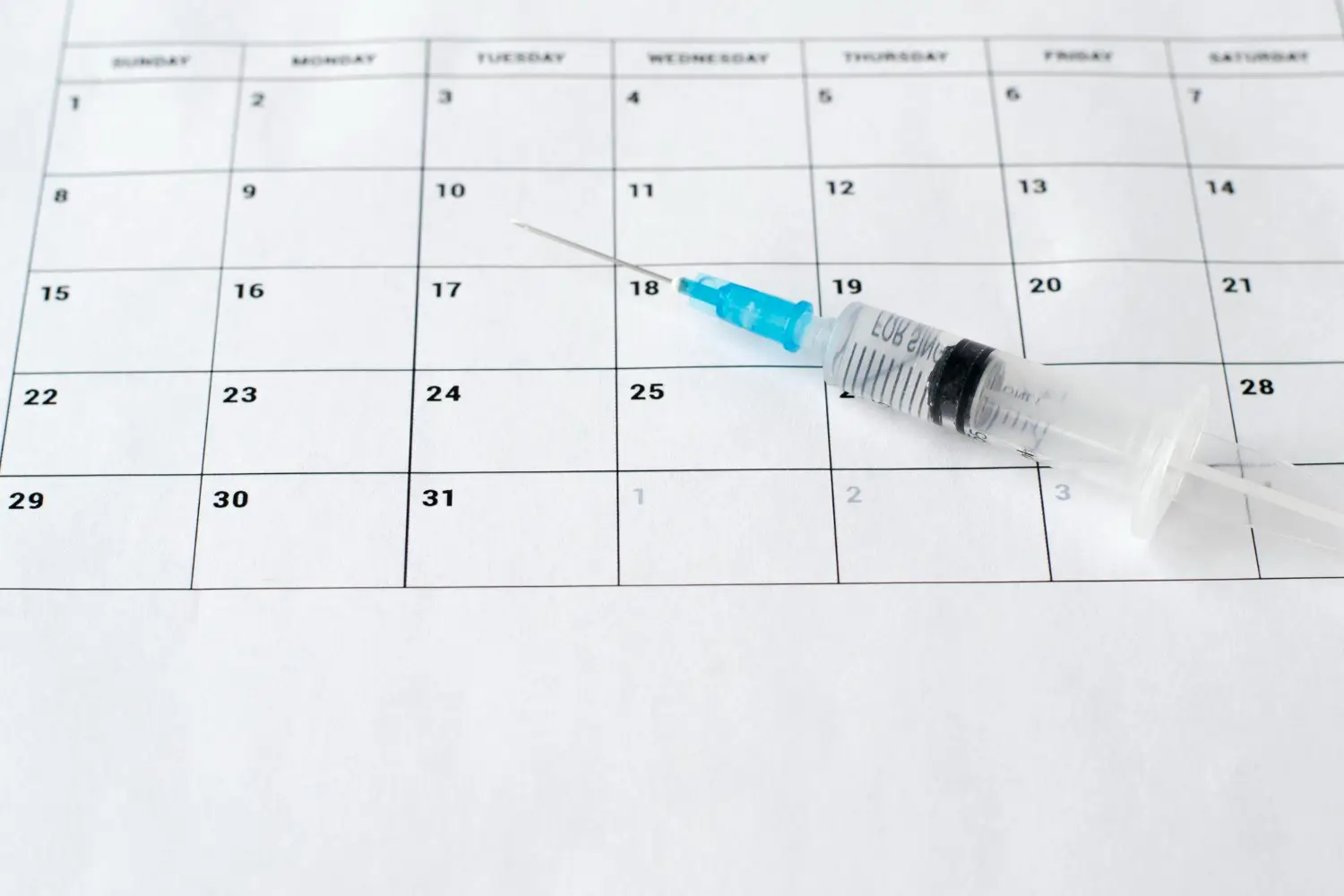Contraceptive methods come in many forms, but long-acting options like injectables stand out for their ability to provide reliable pregnancy prevention with minimal effort. According to the CDC, Depo-Provera has a typical-use failure rate of just 6%, making it a highly effective choice when used correctly. Unlike daily methods, injectables offer the convenience of monthly or quarterly dosing, freeing individuals from the need for daily adherence.
Depo-Provera, an injectable contraceptive containing medroxyprogesterone acetate, is administered every few weeks to ensure continuous protection. This timed schedule is key to maintaining efficacy and ensuring consistent pregnancy prevention. However, staying on track with the recommended injection intervals is critical to avoid gaps in protection.
In this article, we’ll dive into the Depo-Provera shot schedule, covering the standard dosing interval, injection windows, and key factors to consider for maintaining optimal contraceptive efficacy.
Key Takeaways
- Depo-Provera is a highly effective contraceptive injection containing medroxyprogesterone acetate, administered every 13 weeks to ensure continuous pregnancy prevention.
- The titration schedule begins with a 0.6 mg daily dose, gradually increasing to the maintenance dose of 3.0 mg daily by week 5 to minimize side effects and enhance weight management.
- Adherence to the injection schedule is critical; if an injection is missed, patients should follow guidelines to resume treatment or use backup contraception.
- Subcutaneous Depo-Provera offers a lower hormone dose compared to the intramuscular version and can be self-administered, making it a convenient option with fewer side effects.
- Depo-Provera is suitable for a range of patients, but the timing for initial injections varies depending on the menstrual cycle or postpartum status.
- Regular monitoring with a healthcare provider is essential to ensure safe use and evaluate for potential side effects, including changes in bone mineral density after prolonged use.
About: Medical Spa RX provides medical practices with premium products at the best prices. If you’re looking to buy Depo-Provera online for your practice, the sales representatives at Medical Spa RX can give you guidance.
Standard Depo-Provera Dosing Interval and Injection Schedule
Depo-Provera is a contraceptive injection containing medroxyprogesterone acetate, administered every 13 weeks (or approximately 3 months) for effective pregnancy prevention. This standard dosing interval ensures continuous contraceptive coverage, and adherence to this schedule is crucial for maintaining its efficacy and preventing unintended pregnancies.

The injection is given intramuscularly in the gluteal or deltoid muscle, using strict aseptic technique to prevent infection. If the interval between injections exceeds 13 weeks, a pregnancy test should be conducted before administering the next dose on calendar. Some guidelines allow for a 14-week window, meaning the injection can be given up to 7 days late without requiring additional contraception.
For first-time users, the initial Depo shot should be given within the first 5 days of the menstrual cycle or postpartum, depending on breastfeeding status. Many people ask, “Will the Depo shot stop your period?” For some, this effect can occur over time, although it may not happen immediately. It’s important to note that long-term use (beyond 2 years) may impact bone mineral density, so regular evaluations with your healthcare provider are essential.
Late or Missed Depo-Provera Injections: What to Do
Missing a Depo-Provera injection can compromise its effectiveness, increasing the risk of unintended pregnancy. Understanding the appropriate steps to take after a missed dose is crucial for maintaining contraceptive reliability. Here’s how to manage missed doses:

- Within 14 Weeks: If the injection is delayed but still within 14 weeks, it should be administered as soon as possible to restore contraceptive effectiveness.
- Beyond 14 Weeks: If more than 14 weeks have passed since the last dose, use backup contraception. Also, consult a healthcare provider before resuming injections.
- Emergency Contraception: If unprotected sex occurred after missing a dose, emergency contraception may be needed to prevent pregnancy.
- Pregnancy Test: If a dose is missed and pregnancy is suspected, it’s advisable to take a test before resuming Depo-Provera injections.
- Restarting Depo-Provera: If a long gap occurs between injections, a new dose may require additional contraceptive precautions during the first few weeks of use.
Starting Depo-Provera: Timing Based on Menstrual or Postpartum Status and Calendar
The timing of the first Depo shot on schedule is crucial for ensuring optimal contraceptive effectiveness. The appropriate starting point depends on several factors:
- Menstrual Cycle: The best time to administer Depo-Provera is within the first five days of menstruation for immediate contraceptive effectiveness.
- Postpartum (Non-breastfeeding): Can be given immediately after childbirth for rapid pregnancy prevention.
- Postpartum (Breastfeeding): Wait until six weeks postpartum to minimize potential effects on milk production.
- After Miscarriage or Abortion: Depo-Provera can be started immediately to prevent pregnancy.
- Switching from Another Contraceptive: The timing depends on the previous method used, and a healthcare provider can help determine the best transition strategy.
Subcutaneous Depo-Provera as an Alternative Option
Subcutaneous Depo-Provera is an alternative to the traditional intramuscular injection, offering a lower hormone dose while maintaining its contraceptive effectiveness. This version offers additional benefits, such as the option for at-home administration and potentially fewer side effects.
- Lower Hormone Dose: The subcutaneous version contains 104 mg of medroxyprogesterone acetate that is the form of the hormone progestin, compared to 150 mg in the intramuscular version.
- Injection Site: Administered under the skin in the thigh or abdomen, rather than the muscle.
- Similar Effectiveness: It provides the same level of pregnancy prevention as the intramuscular version.
- Reduced Side Effects: Some users report fewer side effects due to the lower hormone dose.
- Self-Administration Option: Patients can use the subcutaneous version for at-home use, as long as they receive proper guidance from a healthcare provider.
Conclusion
Maintaining a consistent Depo-Provera schedule is crucial for effective contraception. Key strategies for success include setting reminders for injections, tracking dates to prevent missed doses, and consulting a healthcare provider for delayed doses. Additionally, considering alternative options like subcutaneous Depo shot can offer greater convenience while ensuring continuous pregnancy prevention.
By following the proper schedule and understanding how to manage missed doses, individuals can enjoy the benefits of long-term contraception with minimal disruption. Regular check-ins with a healthcare provider can help ensure optimal results and support overall health.
FAQs
1. How effective is Depo-Provera?
Depo-Provera is 99% effective when administered on schedule; however, typical use reduces its effectiveness to 94% due to missed doses.
2. Can Depo-Provera affect fertility?
Fertility may take 10 months or longer to return after stopping Depo-Provera.
3. Does Depo-Provera cause weight gain?
Some users experience weight gain, but the effects vary among individuals.
4. Can breastfeeding individuals use Depo-Provera?
Yes, but experts recommend waiting six weeks postpartum to minimize effects on milk production.
5. What are the common side effects of Depo-Provera?
Side effects include irregular bleeding, headaches, nausea, and mood changes.
6. Is Depo-Provera reversible?
Yes, but it may take several months for ovulation to resume after stopping injections.
7. Can I switch from Depo-Provera to another contraceptive?
Yes, but timing depends on the new method chosen. Consult a healthcare provider for guidance.
References
Appendix D: Contraceptive Effectiveness. www.cdc.gov. https://www.cdc.gov/mmwr/preview/mmwrhtml/rr6304a5.htm
CDC. Contraception and Birth Control Methods. Contraception. Published August 6, 2024. https://www.cdc.gov/contraception/about/index.html





















